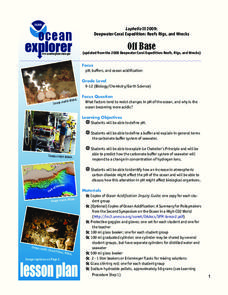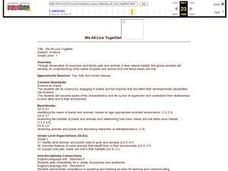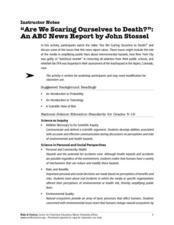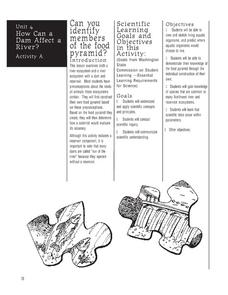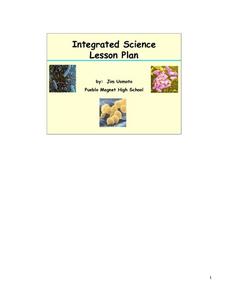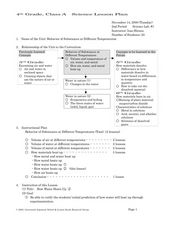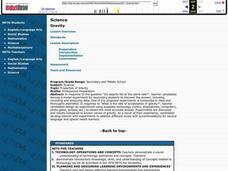Curated OER
Off Base
High schoolers explain the Chatelier's Principle. In this pH lesson, students identify factors that resist changes in pH of the ocean and why the ocean is becoming more acidic.
Curated OER
Science- Unit on Matter- Solids
Second graders identify and describe properties of matter.
They identify three forms of matter- solids, liquids, and gases with 100% accuracy. The student describes the properties of solid objects.
Curated OER
Honesty and Ethics in the Science Lab
Students complete a variety of lab and discussion activities as they are introduced to ethics and honest lab practices. They perform various biology, chemistry, or physics labs which test their ethical lab practices.
Curated OER
Science: Floating and Sinking Objects
Second graders discuss why some objects float while others sink. They examine various objects and predict whether or not they will sink or float. Students discover the properties needed for objects to float.
Curated OER
Feel the Vibrations
How does sound travel in a string walkie-talkie? Third graders read about the way vibrations act between two cups and a string. Next, they put the steps in order, and experiment with their own walkie-talkies.
American Chemical Society
Man and Materials Through History
From the start of the Industrial Revolution, it only took 147 years for someone to invent plastic. This may seem like a long time, but in the history of inventing or discovering new materials, this is incredibly fast. An informative and...
American Chemical Society
Development of Baking Powder
Did you know baking powder can be used to treat acne, whiten teeth, and make sugar cookies? The lesson plan on the development of baking powder is ready-to-go with no preparation required. Through readings, pupils answer questions,...
Curated OER
We All Live Together
First graders examine the lifestyle of classroom and family pets in their natural habitat. They determine the needs of plants and animals, and how those needs are met. They listen to read alouds, sing songs, and draw using computer based...
Curated OER
The Scientific Method
Students study the steps involved in the scientific method. They apply the scientific method to their science fair projects.
Curated OER
Are We Scaring Ourselves to Death?
Interesting! Have your high schoolers watch this 13-minute clip from the documentay, "Are We Scaring Ourselves to Death?" It examines the fear we have as a culture about death and whether or not the media increases those fears. The focus...
Curated OER
Investigate Pine Creek!
Students are invited to become detectives in this Web-Integrated Science Environment (WISE) as they explore a local creek, its environment and ongoing status. Students participate in field trips, acquisition of data through water testing...
Curated OER
Genetically Modified Foods in Perspective
Students research the concept of genetically modified foods. The purpose of the research is to increase science content knowledge and comprehension of the controversy surrounding the subject.
Curated OER
Invertebrate Phyla
Students explore the invertebrate phyla. They discuss the characteristics of the invertebrate Phyla in the Kingdom Animal. Students classify organisms into Phyla based on their characteristics. They distinguish radial symmetry, bilateral...
Foundation for Water & Energy Education
How Can a Dam Affect a River? Activity A
Written for Washington state students in life science, this lesson provides an opportunity to examine the residents of local freshwater habitats. You or the class collects a water sample, and learners try to examine what organisms live...
Curated OER
Scientific Method Unit: Bacteria
Young scholars discover how to apply the steps of the inquiry process through the study of bacteria. Working in groups of four, they cooperatively read an article about bacteria and complete a graphic organizer. Group members share with...
Curated OER
The Origin of Life: Alternative Views
Students explore the topics of faith and science as they relate to the origins of life. They consider the major points of Darwin's Theory of Evolution and brainstorm various explanations of how life began. Students investigate different...
Curated OER
Pebbles, Sand and Silt -- Categorizing Fiction and Informational Books
Primary readers complete the activities in a Pebbles, Sand and Silt FOSS kit. As a class, they are given a group of rocks and they are to categorize them based on their activities in the FOSS kit. They use this information and apply it...
Curated OER
Will It Sink Or Float?
Have your class predict whether objects will sink or float in water. Learners consider a data table of mass, volume and whether the object sank or floated. They develop an evidence-based explanation for the results.
Curated OER
Sometimes, solid + liquid = gas
Third graders experiment with common household liquids and solids. In this chemical reaction lesson, 3rd graders discuss phase changes and experiment to find other ways to create gases. They use water, vinegar, lemon juice, flour, baking...
Curated OER
How Water Heats Up
Fourth graders conduct experiments heating water. In this inquiry-based early chemistry lesson, 4th graders use the materials given to experiment with the process of heating water. Students draw conclusions based upon their findings...
Curated OER
Termitology
Students engage in an inquiry-based study of the ecology of termites. Through hands-on investigations, they explore the life cycle of termites, the termite's role in the food web, and the unique social structure of termite colonies.
Curated OER
Gravity
Students perform inquiry in response to the question "Do objects fall at the same rate?", teacher candidates discuss a model experiment for secondary students to discover the answer, including recording and analyzing data.
Curated OER
Conducting a Scientific Investigation
Students investigate a possible health problem in the local school district through inquiry into attendance records, activities, maps, graphs, and data tables. The simulation continues as solutions for the problem are sought.
Curated OER
Striking It Rich!
Fifth graders explore the California Gold Rush. They explore the lure of gold and the Wild West, how pioneers traveled to the West, and the hardships and people they encountered along the way. Activities be authentic, hands-on, and...
Other popular searches
- Inquiry Based Science Lessons
- Inquiry Based Science Water
- Science Inquiry Based
- Inquiry Based Science Lessons
- Inquiry Based Science Sose
- Inquiry Based Science Souse
- Science Inquiry Based Learning


